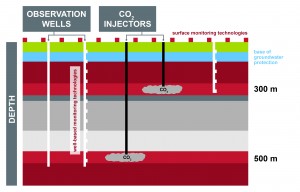A workshop to identify possible interactions between UK research projects and the wider CMC’s Field Research Station (FRS) research program is being held in Cranfield on April 20 and 21 by the UK Carbon Capture and Storage Research Centre (UKCCSRC) and CMC.
Facilitating the meeting will be Don Lawton, Director of CMC’s Containment and Monitoring Institute.
Event targets UK researchers
This event targets UK researchers currently working on projects that may be relevant to the FRS, and will be held immediately before the April UKCCSRC Biannual meeting. The UKCCSRC will support UK researchers in undertaking work at the FRS through an upcoming call of the Centre’s International Research Collaboration Fund.
The FRS is a unique site where measurement, monitoring and verification technologies can be deployed to determine the detection threshold of CO2 at depths of 300 and 500 metres. Lawton notes there are sites where CO2 has been injected to 30 m to see how the gas behaves and at other locations research is being conducted at depths of 2 km or more. But little is known about the detectability and fate of CO2 at intermediate depths in the subsurface.
“What is the detection threshold of CO2 for a whole range of monitoring systems that we’ll be installing here? That’s really the whole driver of this project,” says Lawton.
The workshop follows on from a March meeting between representatives from UKCCSRC and CMC Research Institutes, at the Canada-UK CCS Meeting in London to explore future collaboration opportunities and access for UK researchers to CMC’s new Field Research Station, which is currently under development.
First well drilled at site
The first well at the FRS was recently drilled at the southern Alberta site, and this will be converted into an injection well later this year, with plans to complete a second injection well and up to four observation wells later this year. Geophysical, geochemical, geomechanical and geodetic monitoring of the subsurface gas plumes will be complemented by near-surface hydrogeological studies to better understand shallow groundwater systems, near-surface subsurface fluid flow, and to establish the fate of both CO2 and methane in aquifers below ~225 m depth, which is the local base of groundwater protection.
“The FRS offers tremendous opportunity for researchers working to develop new technologies or to refine current methods. Carbon capture and storage is a key strategy to reduce carbon emissions, but in order to advance the technology and secure government and public support we need to ensure CO2 can be stored securely. The technologies at the FRS will offer that assurance. We want the site to be accessible to the international CCS research community and we welcome collaborations with interested researchers from the UKCCSRC,” says Lawton.
MOU Partners
Richard Adamson, President of CMC Research Institutes, and Prof. Jon Gibbins, Director of the UKCCSRC, signed a Memorandum of Understanding (MOU) in May 2014 to advance an already cooperative relationship between the two research organizations – both of which invest to develop and validate technologies and practices to make carbon capture and storage (CCS) a practical industrial response to carbon emission constraints. In both Canada and the UK, capturing carbon and storing it underground plays a critical role in greenhouse gas reduction strategies.
International Research Collaboration
Richard Adamson, President of CMC Research Institutes, says a primary catalyst for incubating new ideas, breaking new research ground and bridging the science innovation gap is international collaboration.
“The challenge of climate change can only be addressed through collaborative global action by organizations and individuals from private, public, academic and not-for-profit sectors. Joint international ventures are essential to discovering and accelerating the technical solutions and international systems and processes that will lead us to a low carbon world,” says Adamson.
Jon Gibbins, Director of UKCCSRC said, “The FRS gives researchers a unique opportunity to improve techniques for tracking CO2. The UKCCSRC is very grateful to CMC Research Institutes for their help in facilitating access by UK project teams to this world-class facility.”
